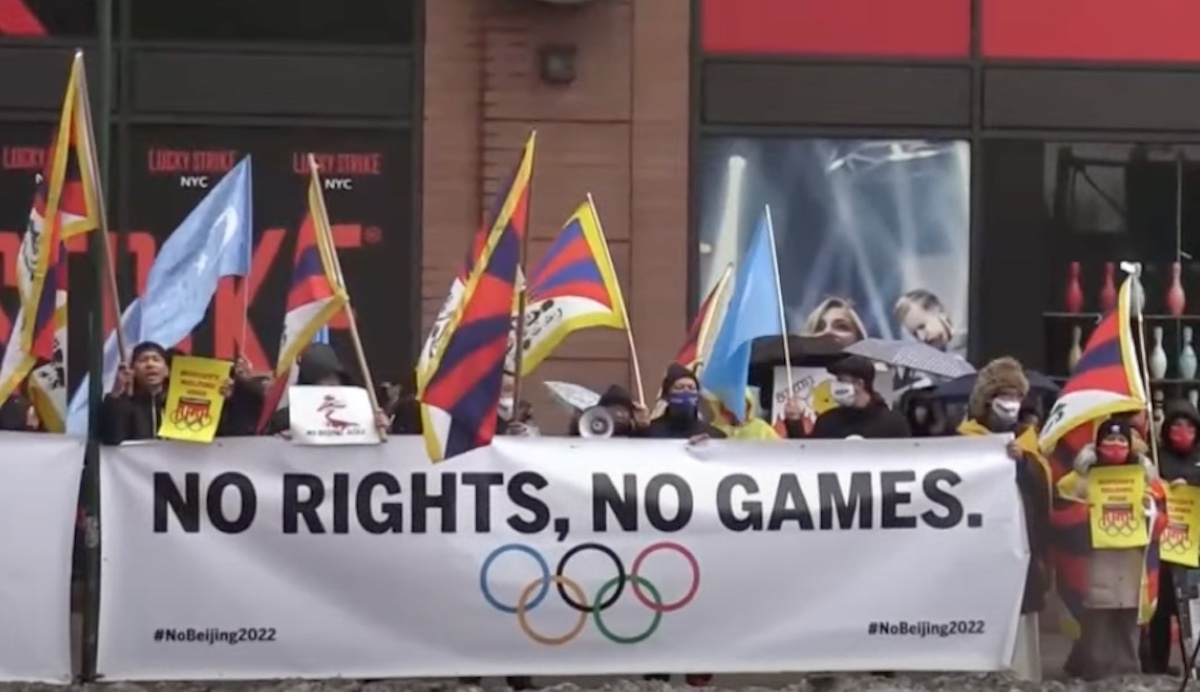Why Are People Boycotting the 2022 Winter Olympics?
The sad reasons you are having moral qualms about watching the Olympics this year.

I am one of those people who think the Winter Olympics are far better than their summer counterparts. This is especially true since Yuri on Ice helped remind me that figure skating is the absolute best. However, this year, Winter Olympic lovers such as myself are having a hard time justifying watching the 2022 Beijing games.
Boycotts are everywhere, from watchers not tuning in to countries not sending diplomats. If you haven’t been keeping up on world politics over the past few years (you lucky, lucky person), you may be wondering what the reasoning is behind the boycott.
The answer is, of course, complicated. But first, let’s address the loudest elephant in the room, which is not why the boycotts are happening. Most of the media coverage I’ve heard is opting to talk about China’s incredibly strict COVID policies (which are also, one must admit, largely effective—consider this New Yorker article from 2020). In the case of the Olympics, athletes and such are being circulated in so-called “closed loops.” While new reports are showing how bad quarantine conditions are, China’s zero-COVID policy is in no way the reason for the boycott.
The reason behind the boycott has to do with China’s human rights abuses over the past several years. The biggest concern is China’s crackdown in Xinjiang, a province in the northwest corner of the country. Xinjiang is the native home of Uyghurs, Kazakhs, and other Turkic groups—ie, not Han Chinese people. As such, the province has a bumpy history, which came to a head in 2017, when the Chinese government began sending Uyghurs and Kazakhs to internment camps en masse. This continues into the present. Between 1 to 3 million people are estimated to have been sent to these camps.
For a detailed look into what the internment camps and life after them is like, I empathically recommend you read the story of Anar Sabit. The camps reportedly have horrible conditions, in addition to reports of sexual abuse and torture. Inmates are made to do cheap, forced labor. The aim of the camps is to “reeducate” inmates, which involves forcing them to eschew the Islamic faith. Xinjiang itself is now a police state.
Sadly, there’s more. There’s also the matter of the crackdown in Hong Kong, which began in earnest in 2020. Essentially, Hong Kong was a British colony until 1997(!), when it was handed over to China. Since then, Hong Kong existed as a semi-autonomous region with a (mostly) democratic system. In 2020, the Chinese Communist Party passed a national security law bringing Hong Kong more closely into their fold. Protests broke out, leading to the arrests of pro-democracy activists. In the most recent elections in Hong Kong, in December 2021, pro-Beijing candidates swept the ballot box as voter turnout was uncharacteristically and cryptically low.
So … between Hong Kong and Xinjiang, not to mention Taiwan or Tibet, people are boycotting the Beijing Olympics. Several countries—including the US, the UK, India, and Canada – have specifically cited human rights abuses as their reason for not sending diplomatic envoys. Also, I guess Meghan McCain called them the “genocide games.”
At least we can watch Yuri on Ice instead.
(Image via screengrab/The Guardian)
—The Mary Sue has a strict comment policy that forbids, but is not limited to, personal insults toward anyone, hate speech, and trolling.—
Have a tip we should know? [email protected]
